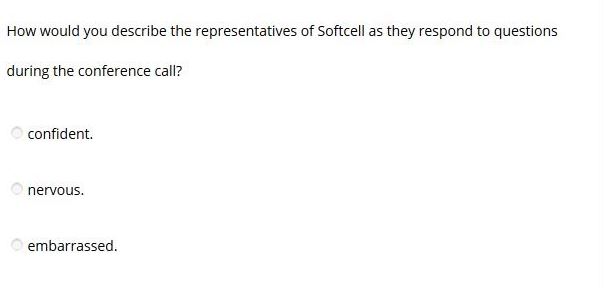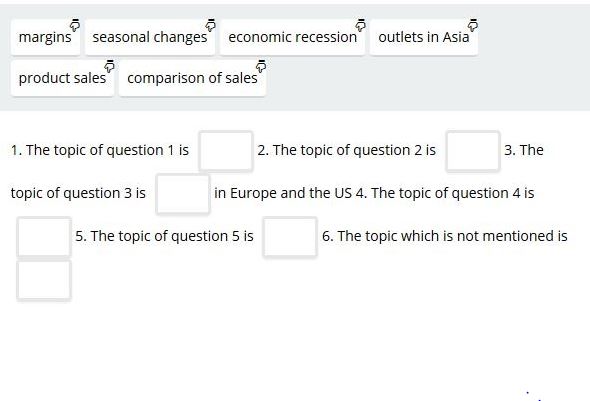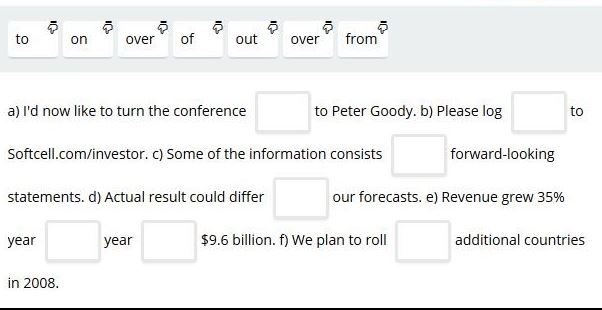CONFERENCE CALLS
Atelier 2
Mise en situation.
PROGRAM
PART 1
Comprehension
Role play
Oral expression
Sentence structure
PART 2
Best practices
Role play
Saying key sentences
COMPREHENSION
Comprehension exercice
VERBS
SENTENCES
We have a lot to accomplish today, so let's begin.
I hope we do not have to address this matter again in the future.
If there are no further comments, we will adjourn the meeting here.
I forgot to allocate someone to bring refreshments.
Let's take a few minutes and brainstorm some ways that we can cut costs.
The board fell apart because the members had difficulty collaborating.
We will commence as soon as the last person signs the attendance sheet.
If no one volunteers to take the minutes I will be forced to designate someone.
It's not a question of whether or not we're going to use this idea, it's whether or not we know how to implement it.
I recommend that you sit closer to the front if you have trouble hearing
We need to vote for a new vice chairperson now that Jerry is retiring.
Let's wrap up here so that we can get back to our desks.
I recommend that you sit closer to the front if you have trouble hearing
DEFINITIONS
Accomplish : succeed in doing
Address : deal with, speak on
Adjourn : close a meeting
Allocate : assign roles/tasks to certain people
Brainstorm : thinking to gather ideas
Collaborate : work together as a pair/group
Commence : begin
Designate : assign
Implement : make something happen; follow through
Recommend : suggest
Vote : to express (the expression of) an opinion in a group by voice or hand
Wrap up : finish
ADJECTIVES
The vice president is absent due to unforeseen circumstances.
Any financial information shared during this meeting should be kept confidential.
It is mandatory that all supervisors attend Friday's meeting.
Firstly, I want to thank you all for being punctual despite this early meeting.
The vote was unanimous to cut work hours on Fridays.
DEFINITIONS
Absent : not present,
Confidential : private; not to be shared
Mandatory : required
Punctual : on time (not late)
Unaminous : in complete agreement; united in opinion
NOUNS
SENTENCES
Please forward the agenda to anyone who is speaking at the meeting.
We always vote for a new chairperson at the AGM.
The last item on the agenda is AOB.
Everyone is present today, so we can skip the apologies.
Please fold your ballot in half before you place it in the box.
The board of directors meets once a month to discuss the budget
The boardroom is reserved for a managers' meeting, so we'll have to meet in the lounge
The role of treasurer was decided based on the chairman's casting vote.
As chair, it is my pleasure to introduce to you, Mr. Allan Davis.
Before we address this matter, I'll need some clarification as to who was involved.
I just have a few closing remarks and then you will all be free to go.
If you have a comment, please raise your hand rather than speak out.
Before the conference there will be a private meeting for board members only.
Please make sure I have no interruptions while I'm on the conference call.
If we cannot come to a consensus by the end of the meeting we will put it to a vote.
The deadline for buying tickets to the conference is May 25th.
Everyone knows who is going to be the next vice president, so this vote is really just a formality.
The first item on the agenda relates to a grievance reported by the interns.
I am delighted to welcome our guest speaker Holly, who is going to be offering some sales pitch tips.
Before we begin with today's meeting, let's quickly review the minutes from last month.
The motion to extend store hours has been passed.
I'm pleased that we were able to cover all of the objectives today within the designated time.
As I mentioned in my opening remarks, we have to clear this room before the end of the hour.
Can I have a show of hands of all of those who were participants in last year's conference?
There must have been one proxy vote because I count twelve ballots but only eleven attendees.
From the show of hands it appears that everyone is in favour of taking a short break.
We need to come up with a strategy that will allow us to have meetings less frequently.
NOUNS, DEFINITIONS
Agenda: list of objectives to cover in a meeting
AGM: Annual (yearly) General Meeting
AOB: Any Other Business (unspecified item on agenda),
Apologies: item on agenda announcing people who are absent
Ballot: a type of vote, usually in writing and usually secret, group of elected members of an organization/company who meet to make decisions
Board of directors: a type of vote, usually in writing and usually secret, group of elected members of an organization/company who meet to make decisions,
Boardroom: a large meeting room, often has one long table and many chairs
Casting vote: deciding vote (usually by the chairman) when the votes are otherwise equal
Chairperson/ chair; the person who leads or presides at a meeting
Clarification/ verification: explanation/proof that something is true/understood
Closing remarks: last thoughts spoken in a meeting (i.e. reminders, thank you)
Comment: express one's opinions or thoughts
Conference: formal meeting for discussion, esp. a regular one held by an organisation
Conference call : telephone meeting between three or more people in different locations
Consensus : general agreement
Deadline : due date for completion
Formality : a procedure (often unnecessary) that has to be followed due to a rule
Grievance : complaint
Guest speaker : person who joins the group in order to share information or deliver a speech
Minutes : a written record of everything said at a meeting
Motion : a suggestion put to a vote
Objective : goals to accomplish
Opening remarks : chairperson or leader's first words at a meeting (i.e. welcome, introductions)
Participant : person who attends and joins in on an event
Proxy vote : a vote cast by one person for or in place of another
Show of hands : raised hands to express an opinion in a vote
Strategy : plan to make something work
Listen to the vocabulary . Note down any of the unfamiliar words. Then compare your list with a partner. Then write sentences using the unfamiliar sentences.
Vocabulary and sentence flashcard
COMPREHENSION
VIdeo
CONFERENCE CALLS AND PUBLIC SPEAKING
ORAL COMPREHENSION
UNDERSTANDING DIFFERENT ACCENTS IN ENGLISH.
Whatever your level in English an unfamiliar accent can be problematic. You can practice listening to new accents by using the accent map link below.
Click on the link
Select a country on the map
Load the file.
SMALL TALK
Le “small talk”, kézako ? C’est cette petite conversation de politesse qui intervient quand on vient à la rencontre de quelqu’un : “Comment allez-vous ? Avez-vous passé un bon week-end ?”… Lors d’une conversation en anglais, le “small talk” vous permettra de vous accoutumer avec le phrasé de vos interlocuteurs avant d’attaquer les choses sérieuses. En plus, cela détend l’atmosphère. N’hésitez pas à l’instaurer !
Structurer son intervention
Ce qui vous fait (un peu) peur ? Que la discussion parte dans tous les sens. Pour ne pas perdre le fil, et éviter l’impro, plus que jamais faites un plan, et tenez vous en à l’ordre du jour. Annoncez-le en début de conférence call et revenez-y point par point. Ce sera un précieux repère, qui vous permettra d’éviter les “Wait a minute please” De plus, sûr de votre plan d’action, vous serez plus détendu et ouvert aux échanges.
Trouver les bons mots
Ne cherchez pas à faire compliqué. Même dans le monde professionnel, votre message passera toujours mieux s’il n’est pas tiré par les cheveux. Donc stop au jargon - d’autant plus en anglais. Basez-vous sur des mots et des concepts simples et concrets, compréhensibles par tout le monde. Petit plus : le stress peut vous faire perdre votre… anglais. N’hésitez pas à inscrire sur une feuille les mots et concepts dont vous souhaitez parler. Vous les aurez sous les yeux au cas où ils ne vous viendraient pas naturellement à l’esprit au cours des échanges.
Se mettre en mode “repeat”
N’hésitez donc pas à demander à votre intervenant de répéter, de reformuler son propos ou encore de ralentir le rythme. Il n’y a pas de honte à cela et il ne vous en tiendra pas rigueur. En revanche, feindre celui (ou celle) qui comprend et finalement manquer des éléments peut être plus embêtant… Vous avez encore un doute ? Faites un “tour de table” et demandez à chacun de résumer son point. Idéal pour vérifier que tout est bien compris !




